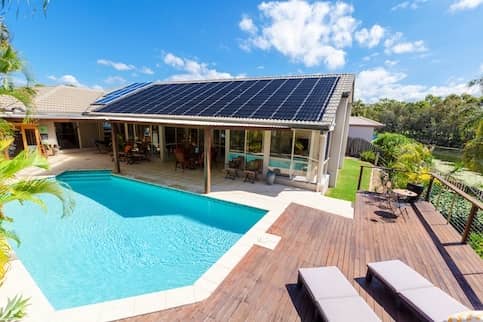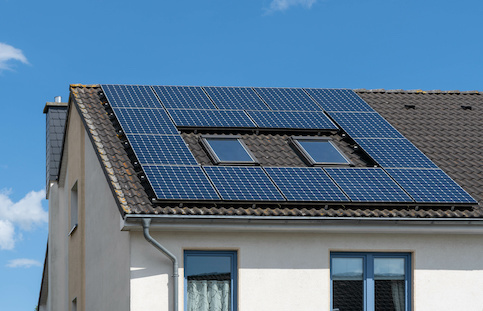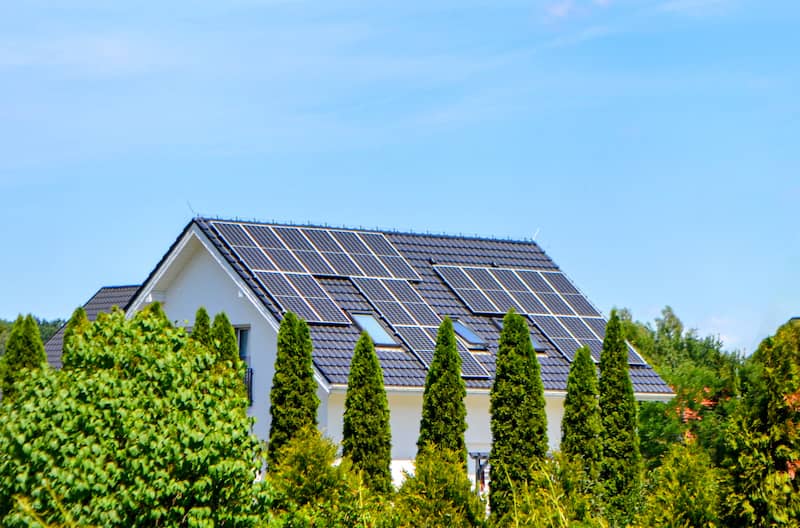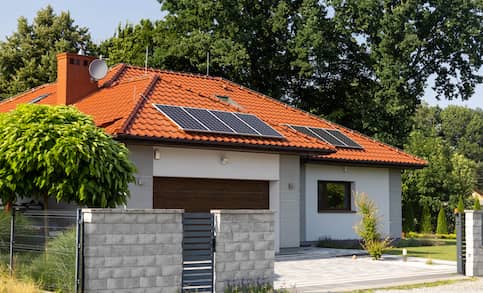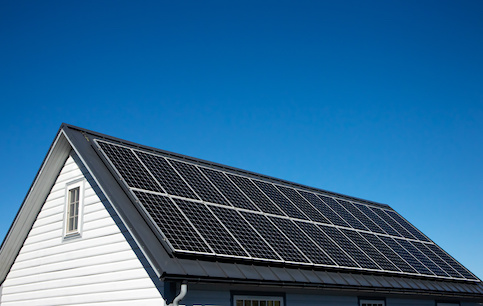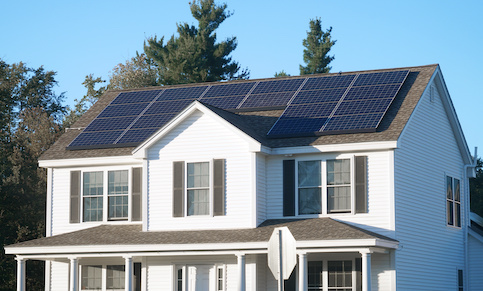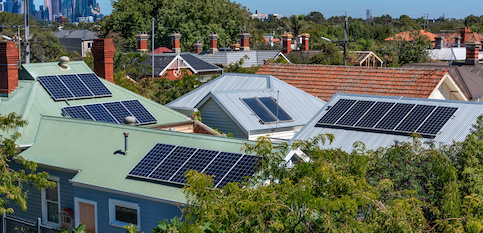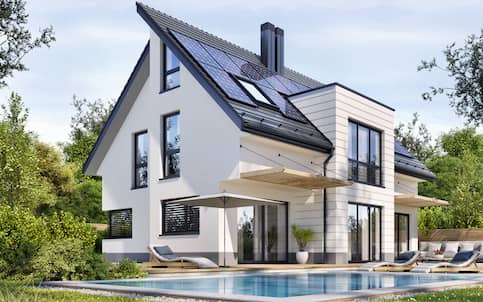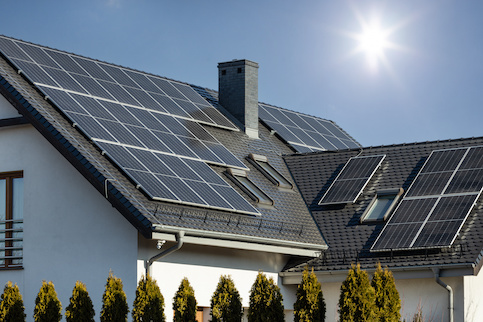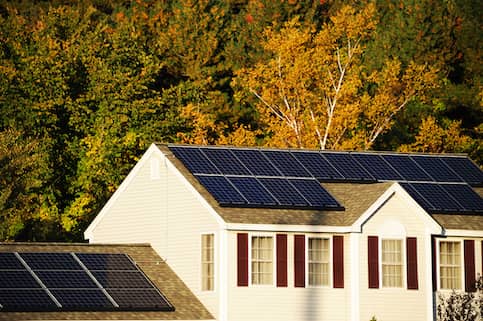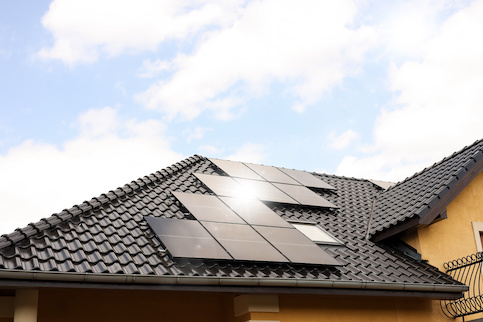When buying a new home, you probably have a good idea of what you’re looking for in terms of square footage, location and yard size. While these might all be important to some buyers, it can be easy to overlook other features – such as solar panels – that could prove just as valuable over time.
Solar panels create clean energy and can help power your home. A functioning solar panel system may add home value and, though it’s an investment upfront, eventually save you money – all while supporting an eco-friendly lifestyle.
Let’s take a look at some of the benefits and drawbacks of solar panels, with a focus on a few considerations to carefully weigh when thinking about buying a home with solar panels.
The Pros And Cons Of Buying A House That Has Solar Panels
Whether buying a house with solar panels is a good idea for you depends on your situation and unique tastes. Let’s explore the pros and cons of this investment so you can better gauge whether a home with solar panels is the right fit for your needs.
Pros Of Buying A Home With Solar Panels
Having a solar system in place upon purchasing a house comes with plenty of advantages. Here are some of them.
Decreased Carbon Footprint
The benefits of buying a house with solar panels go hand in hand with the advantages of renewable energy. Solar panels produce renewable, or “clean,” energy – which is naturally sourced and regularly replenished.
The alternative is a traditional electrical system, which can lead to harmful greenhouse gas emissions, hazardous waste and negative effects on local ecosystems. Meanwhile, the carbon footprint from solar panels is roughly 20 times less than that of its coal-powered counterpart.
Lower Electricity Bills
A lower electricity bill each month is another benefit you may be able to reap when your home has solar panels. Whether solar panels will save you money – and just how much – depends on numerous factors, including location, sun exposure, your energy usage and tax incentives.
Less Grid Dependence
A home with solar panels reduces your dependency on the local power grid. This means no more racing to eat everything in the freezer after the power goes out. Grid independence is especially useful for homeowners in states – such as California, Texas and New York – that experience more frequent outages.
Increased Home Value
Although solar panels are very common in some areas of the country but not so common in others, they can increase home value by thousands, and sometimes tens of thousands, of dollars.
As a result, a seller stands to reap a substantially larger profit on the sale of their home than they would if the house didn’t use solar power.
Tax Breaks And Advantages
Owning a home with solar panels can come with an array of financial incentives beyond lowering your electric bills. Here are some of them:
- Federal Solar Tax Credit: The federal government currently offers a 30% tax credit for the installation of solar energy systems. Tax credits differ from traditional deductions, as they’re a dollar-for-dollar reduction in taxes owed to the IRS.
- Solar Renewable Energy Certificates: Some states have renewable portfolio standards, which means a certain amount of energy they produce must come from renewable sources. To meet these amounts, utility companies may buy SRECs off of homeowners using a credit system. You can earn one SREC for every megawatt-hour your panels generate. The value and availability of SRECs also vary by state.
- Tax exemptions: Despite solar panels adding home value, some states have established tax exemptions for solar panels. This means the value solar panels add to your home won’t be factored into your property taxes.
- Utility company rebates: Some state utility companies also offer rebates to incentivize homeowners to install solar panels. This is the case in Austin, Texas, where homeowners may be able to earn a $2,500 rebate from Austin Energy.
The number of programs and the types of incentives vary by state, so check the Database of State Incentives for Renewables & Efficiency to learn more about what’s offered in your area.
Cons Of Buying A Home With Solar Panels
Before taking on the responsibility of buying a home with solar panels, it’s important to be mindful of the various trouble spots discussed next.
System Financing
The best-case scenario for buying a home with solar panels is that the seller has full ownership. Under this arrangement, you also get 100% ownership of the system, no strings attached. If the seller’s solar panel system is leased or tied to a solar power purchase agreement, you’ll be taking on monthly payments.
Ask questions to understand what the financing looks like, whether payments are fixed or variable, and how much you can expect to pay in premiums.
Weather Dependency
It might sound obvious, but solar panels are dependent on the sun. Consequently, periods of cloudiness or gloomy weather can affect your system’s efficiency and how much energy you’re actually getting. You should also expect less output during the winter as days become shorter.
Roof Replacement And Repair Costs
Solar panel installation is pricey. While buying a house with a solar panel system in place increases your odds of avoiding lofty installation fees, you’re going to need some serious cash ready for reinstallation if your roof gets damaged or you need a replacement.
Solar panel installation costs vary based on region, wattage, material and other factors, but according to national home improvement retailer Home Depot, the cost for installing the average 5-kilowatt system runs from roughly $11,100 to $22,400.
What’s Your Goal?
Buy A Home
Discover mortgage options that fit your unique financial needs.

Refinance
Refinance your mortgage to have more money for what matters.
Tap Into Equity
Use your home’s equity and unlock cash to achieve your goals.
What To Know About Buying A House That Has Solar Panels
As mentioned earlier, solar panel systems – and who owns them – can affect your home buying process. Next are some insights on what to expect in two different situations.
Buying A House With Owned Solar Panels
The only real downside to buying a home with owned solar panels is that the added value may drive up the purchase price. More competition for the house you have your eye on is possible, but you won’t have to make any monthly payments or deal with the cost of installation.
Buying A House With Leased Solar Panels
When buying a house with leased solar panels, you’ll need to ask some questions and understand exactly what you’re getting into. Leases can complicate the transaction, especially if the manufacturer has any liens. In some cases, solar panel manufacturers may uninstall the system entirely to remove a lien before the time of closing.
Familiarize yourself with the solar lease agreement before deciding if you want the payments and contract transferred to you. You can also negotiate with your seller, and you may be able to buy your way out of the lease.
Ready To Become A Homeowner?
Get matched with a lender that can help you find the right mortgage.
Items To Consider When Buying A House With Solar Panels
When buying a house with any kind of unique feature, it’s important to ask the right questions. Here are some questions to ask before deciding to buy a house with solar panels.
Solar Panel Installation
You wouldn’t want an uncertified electrician or a novice carpenter working on your home, and the same goes for solar panel servicers. Before closing on your house, confirm that a reputable company carried out the installation.
You should also ask about existing warranties or maintenance plans so you can have them transferred to your name before completing the sale.
Financing Solar Panels
Unlike solar loans, property assessed clean energy financing is attached to a specific property, not a borrower. Through it, payments are made via property taxes, meaning they become your responsibility when buying a home that has PACE financing.
Solar Panel Incentives
In addition to the rebates, tax credits or tax exemptions you may be eligible for, owning a home with solar panels allows you to try out net metering. Net metering lets homeowners sell excess electricity back into the grid. Laws and regulations surrounding how net metering is carried out vary greatly by area, so research is vital to understanding the financial gains.
Your state might use SREC credits or performance-based incentives, which pay you a per-kilowatt-hour credit. Either way, net metering will allow you to rely on grid energy at a discounted rate if you need some in the future.
Take The First Step To Buying A Home
Find a lender that will work with your unique financial situation.
The Bottom Line
Just how much you stand to benefit from owning and operating a solar panel system depends on your homeownership goals and plans. Inheriting monthly payments or applying for net metering isn’t for everyone. But if you’ve quite simply just never considered solar panels, you may want to take a closer look at the financial incentives and advantages of clean energy.

Holly Shuffett
Holly Shuffett is a writer who writes with a focus on homeownership and personal finance. She has a bachelor's degree in public relations from Oakland University and enjoys creative writing and reading in her free time.
